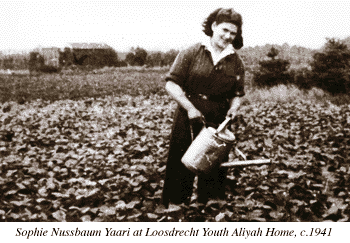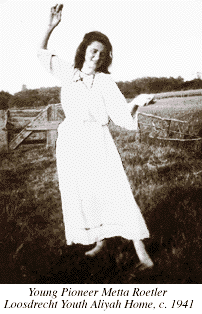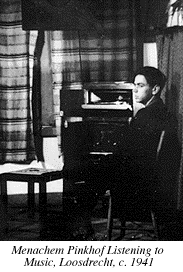Sophie Yaari Tells Her Story (continued)


Loosdrecht Youth Aliyah : One month later Ruth and I came to Loosdrecht. Then it was our happy time. The leaders were only four or five years older than us, and they treated us like people, not like stupid children. They understood us. Menachem was very good; Shushu was wonderful, someone very special. There was also Hanna for the girls, and a teacher named Lodi. We learned all about Palestine. They taught us Hebrew. Menachem was crazy about classical music--especially Bach--and he taught us to love music. We worked there, we studied there, we learned there; we were free. I was very happy.
In May 1940, we were evacuated for a few days while the Dutch army tried to fight the German invasion. Then it was all over, and the Germans ruled Holland. We went back to Loosdrecht, and went on with our lives.
 We lived in a protected world--as if in a hothouse--without feeling what was going on around us. The Germans started with their decrees and prohibitions; we did not feel it. They knew it would not be so easy to do the things in Holland they had done in Germany, so they began slowly. They had lists with every name and address, just as they did in Germany. In the summer of '42 they began with the transports, taking the Jews away to
Westerbork
and to Poland.
We lived in a protected world--as if in a hothouse--without feeling what was going on around us. The Germans started with their decrees and prohibitions; we did not feel it. They knew it would not be so easy to do the things in Holland they had done in Germany, so they began slowly. They had lists with every name and address, just as they did in Germany. In the summer of '42 they began with the transports, taking the Jews away to
Westerbork
and to Poland.
Going Underground: One day that summer I went to Amsterdam to meet a Jewish family I had heard about; they were from Emden, my home town. The woman couldn't do housework because she suffered from eczema; she asked if I could help her out. The leaders at Loosdrecht said it was all right, so I left my Youth Aliyah home to live with her for a few months.
On July 7th, while I was still living with her family, I received a letter telling me to report to the train station in three days. I asked Mrs. Bloot what to do. Mrs. Erica Bloot was a very nice Jewish lady from Amsterdam who came every week to Loosdrecht to give us lessons in classical history. She did so much for us, she was almost like our mother. She was able to arrange permission from the Germans for me to stay on with the family from Emden, but it was only for the time being. They said I would be getting another letter in the future.
The woman I was helping wanted me to stay on with her, and not go back to Loosdrecht. About the next letter I was assured of receiving she said, "If we have to go, we will go. God willed it. If we hide with Christian families, we won't have kosher food. At least in Westerbork the food will be kosher." She really said that! There was even a Christian family that offered to hide her and her family, but she said no.
Nobody could believe what was happening. But in every Jewish house there was a rucksack ready for each person, with warm clothes, a scarf, and vitamins. Although we didn't know what was actually happening, in some sense we knew. We felt it. I think we knew people were not coming back.
"I'm sorry," I told her, "but I want to be with my family, and my friends are my family." I went back to Loosdrecht the next day.
Mrs. Bloot had good connections with the Joodsche Raad (Jewish Council) in Amsterdam. She told the Loosdrecht leaders that if any of us were on the transport list she would give them warning. At the time however, we children didn't know anything about this--only Menachem, Shushu and Mirjam Waterman; they kept it very, very secret.
Mirjam was not one of our leaders, but she lived close by, and was Menachem's friend--that was the connection. We saw them together all the time.
 It was Mirjam who had the idea how to help us young people in Loosdrecht. If it were not for her we would not be alive. I can tell you that's really true. She had connections with non-Jewish people in the Socialist movement, and she used them very well.
It was Mirjam who had the idea how to help us young people in Loosdrecht. If it were not for her we would not be alive. I can tell you that's really true. She had connections with non-Jewish people in the Socialist movement, and she used them very well.
At some point early in August Mrs. Bloot telephoned our Loosdrecht leaders, saying that on the 15th, or 16th--I don't remember exactly--we would all have to report to the station in Amsterdam. But they didn't tell us young people about it--we never knew about any of our leaders' troubles or worries. We never felt anything was wrong, and we never asked.
Then on the evening of August 13th they called us together for a special meeting. We gathered in what we called our "learning room," our study room. Menachem began to speak.
"Pioneers, we have received notice that we are to report to the train station in Amsterdam. We have decided not to go. We have found many good Christian friends who will help you for the duration of the war. How long it will be, nobody knows. You must do what these people ask of you, even if it is not always pleasant. There may not always be enough to eat, but they are helping you, and saving your lives. Be good." That was his speech.
Shushu spoke too: "In half an hour people will be coming to take some of you away, but not everyone, since we still haven't found enough places. Some of you may be at your first addresses only temporarily until a better place is found. We won't forget you. We will be working for you."
That same evening Shushu took me, my sister, and our friend Paul Zonderman by train to Amsterdam. It wasn't as simple as it sounds. We didn't have the proper identification, and Shushu looked very Jewish--if we were stopped we could be arrested. In Amsterdam we came to a street of very old, tall houses. He took us up three or four flights, to the attic in one of these houses. There were two very dirty rooms, and no toilet or shower. We were told to use a flower vase for a toilet, and empty it out of the window on to the roof--there was no other way. The other rooms in the house were rented to students, two or three to a room. We were in the flat of a writer who was away on a two week holiday. We could stay until he came back, but the woman who owned the house was not supposed to know we were there.